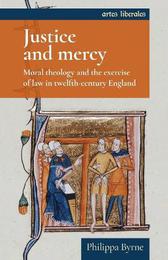
|
Justice and Mercy: Moral Theology and the Exercise of Law in Twelfth-Century England
Paperback / softback
Main Details
| Title |
Justice and Mercy: Moral Theology and the Exercise of Law in Twelfth-Century England
|
| Authors and Contributors |
By (author) Philippa Byrne
|
| Series | Artes Liberales |
|---|
| Physical Properties |
| Format:Paperback / softback | | Pages:304 | | Dimensions(mm): Height 216,Width 138 |
|
| Category/Genre | History of religion |
|---|
| ISBN/Barcode |
9781526155900
|
| Classifications | Dewey:347.42009021 |
|---|
| Audience | | General | | Tertiary Education (US: College) | | Professional & Vocational | |
|---|
| Illustrations |
3 charts
|
|
Publishing Details |
| Publisher |
Manchester University Press
|
| Imprint |
Manchester University Press
|
| Publication Date |
1 June 2021 |
| Publication Country |
United Kingdom
|
Description
This book examines one of the most fundamental issues in twelfth-century English politics: justice. It demonstrates that during the foundational period for the common law, the question of judgement and judicial ethics was a topic of heated debate - a common problem with multiple different answers. How to be a judge, and how to judge well, was a concern shared by humble and high, keeping both kings and parish priests awake at night. Using theological texts, sermons, legal treatises and letter collections, the book explores how moralists attempted to provide guidance for uncertain judges. It argues that mercy was always the most difficult challenge for a judge, fitting uncomfortably within the law and of disputed value. Shining a new light on English legal history, Justice and mercy reveals the moral dilemmas created by the establishment of the common law. -- .
Author Biography
Philippa Byrne is British Academy Postdoctoral Fellow at the University of Oxford -- .
Reviews'Justice and Mercy is a remarkable book...the book resounds with the historiographic traditions and conflicts among the different schools of legal history and of intellectual history, both in Britain and on the continent. While the author is obviously well aware of them, she manages to avoid the pitfalls of adding to these ongoing conflicts.' Esther Cohen, Hebrew University of Jerusalem, The Medieval Review -- .
|